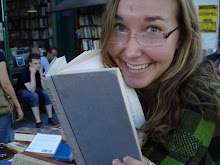I seized the opportunity of this assignment to visit a Pike Place monument of sorts that I had not yet had the-- shall we say, pleasure?-- of seeing. Ah, the gum wall. An excellent opportunity for a "bulwark" pun, and also, a beautiful collection of unity and public faux pas.
As I approached the wall, I didn't feel disgusted, as I had expected I would. Mostly, I felt overwhelmed, and pleased. I happen to love color, and this wall was simply covered, amazingly artistically, in little blotches of individuality that together, created art. What was interesting about this wall though, is that it seems to elicit different reactions in people. Sadly not all of my friends found the wall to be such a visual treat. I brought three of my friends with me to see the wall, each of whom had a different opinion. My friend Jacob immediately said, "Guys, this is kind of disgusting." Mel said, "I'm pretty sure gum doesn't actually come in all these different colors." And Katie observed the wall with little verbal reaction, having seen it before.
It seemed that Jacob couldn't see beyond the details-- the little specks of gum that were in all sorts of mouths, repulsed him. I really couldn't blame him. Gum dangled from ledges, squished together as if inventing new colors, and oozed off of the edifice. I think I enjoyed it because I saw it as a whole, and thought, "God, how much gum IS that? Who the hell started this?" But Jacob helped me pick out the little things: plopped neatly in the center of the gum wall was the word "joy" made of green bubble gum.
Perfect. What a fabulous description of what the wall made me feel. I couldn't help but wonder why, though. Why would gum, something tasty, yes, but generally unpleasant when not being eaten, bring people so much happiness? For one, it makes excellent tourist pictures. Also, I've mentioned unity. When I stuck my gum on the wall as high as I could jump, I felt like I was part of a community of sorts. Perhaps this wall isn't a barrier at all, but rather, it breaks down barriers between people. Though I've never met the gross majority of gum wall contributers, we're connected, somewhat literally, through gum.
In a way, each little piece of gum is an individual, just like the people that pushed the gum into the wall. Like snowflakes, or fingerprints, no two gum pieces are alike. Yet, when combined, each little gum fingerprint makes the city of Seattle.
It was also strange to me that the wall is somewhat difficult to find. Shrouded in a somewhat sketchy alleyway, one must seek it out to contribute. Certainly, to contribute to the wall, one must be motivated to do so. Even Jacob, a skittish and rather germaphobic fellow, pressed his gum into the layers and layers of past generations.
Clearly, walls don't always have to be barriers, and naturally, vice versa. So, I feel that this wall is a perfect example of how some walls can bring togetherness, and, as a stranger so eloquently put it, "joy."


